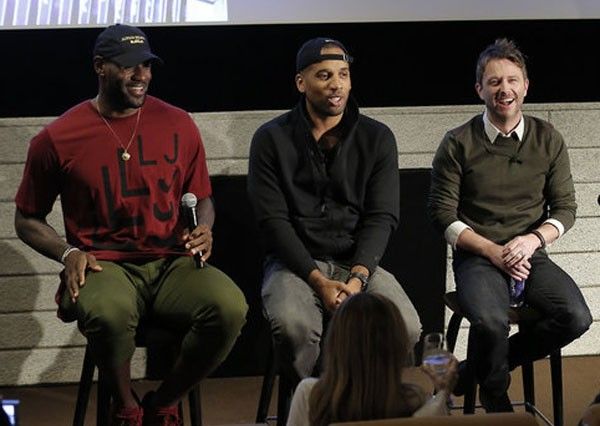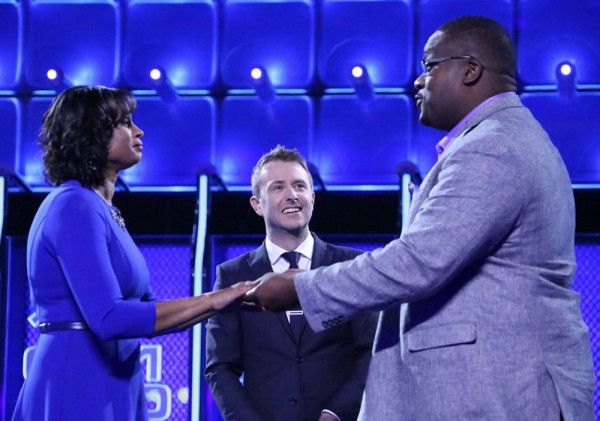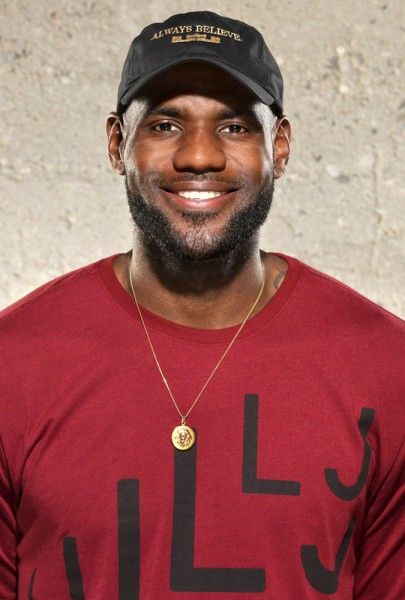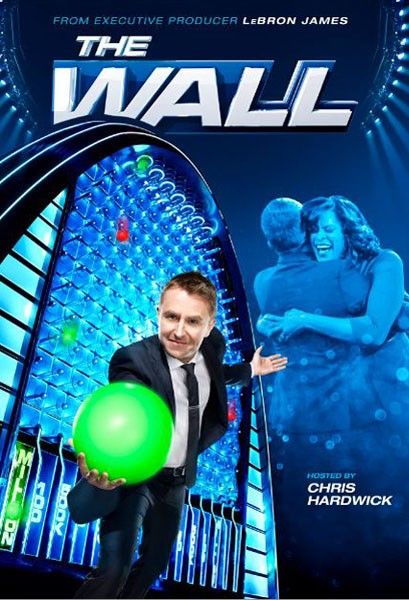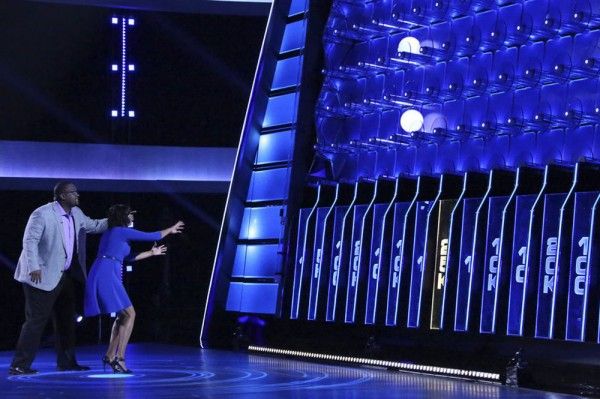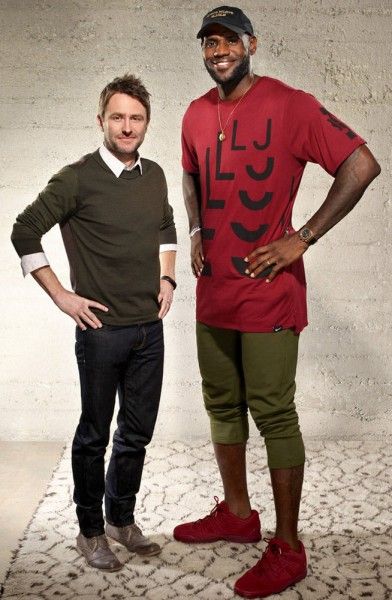From NBA superstar LeBron James and SpringHill Entertainment partner Maverick Carter comes NBC's The Wall, a pulse-pounding game show with more than $12 million on the line, every night. Hosted by actor, comedian, author and TV personality Chris Hardwick, the stakes are high as a pair of teammates answer questions that will result in either a green ball that will fall down the wall and add the value of the slot it lands in to the players' winning total, or a red ball that will deduct the value. At four-stories high, contestants facing The Wall have the opportunity to win tremendous cash prizes, changing their lives in an instant.
After a recent preview of the first episode, executive producers Chris Hardwick, LeBron James and Maverick Carter held a Q&A for press, where they talked about sorting through all of the pitches they get, the appeal of this project, making such a highly emotionally-charged game show, finding contestants you can really root for, having no control over the outcome, getting so deeply invested in how it all turns out, and marketing this experience, in the age of new technology.
Question: LeBron, since you probably get approached to do a lot of different projects, what attracted you to this one, in particular?
LeBRON JAMES: (Creator/Executive Producer) Andrew [Glassman] brought it to us awhile ago, and I just thought it was so authentic and emotional. The show is about regular people who have an opportunity to change their lives, in one second. I think that’s so incredible. I’m a kid from a small town in Ohio, where I wish we had had an opportunity like that. That’s what drew it to me and to my business partner, Maverick. Andrew has done a great job, over the course of time, continuing to make the game as great as it can be, and very easy, at the same time. We didn’t want to do something that was going to be so hard that people can’t answer the questions. We wanted to make it as easy as possible, but at the same time, just add so much emotion to it that everyone can relate to it. So, it was an easy decision for me.
CHRIS HARDWICK: You never know how a show is going to do. You can’t predict whether people are going to watch something or not. So, I just say, “What sounds fun? What do I want to work on?” But honestly, within the first couple of shoot days, one thing that I noticed is that the crew was invested in the show. We’ll take a break and the crew will be like, “I can’t believe they did that!,” or “What was he doing?!” That’s real. Crew guys don’t love everything. They’re the toughest crowd. Our days are really long, but the fact that the crew was invested in the show made me think, “Wow, it’s amazing that they’re actually watching the show like an audience, as we’re shooting.”
Why just $1? Couldn’t you have made the lowest amount be $10?
HARDWICK: It’s so dramatic, though. That’s what so great. It’s fair. It’s completely random. We don’t know what will happen. But, yeah, $1. There’s just so much drama when you’re aiming for $1 million, and then you’re like, “Oh, $1.” It’s heartbreaking. It makes you shout at your TV, which is what we want.
So, there’s absolutely no control over where the balls go?
HARDWICK: Yeah, zero control. There are stricter game show laws in this country than almost anything else. You can’t fix it. It’s completely random. There are probabilities, which you’ll see, when it comes to what you choose, 1 through 7. There’s probability, as to which side of the wall it is likely to land on, but we really don’t know.
Do you put the dollars where the probabilities are the highest?
HARDWICK: No. When you think about it, it’s just money/dollar, money/dollar, money/dollar. It’s a pretty fair distribution, I think.
Will there be contestants that are exes, or anything like that?
MAVERICK CARTER: The problem with that is, how do they split the money?
JAMES: We have enough emotion to the show already. We don’t want to add that.
HARDWICK: You don’t want somebody who’s going to go, “I don’t know how this jerk is going to answer.” You need these people to care about each other because, ultimately, they all have a bond. Every episode, they’re either roommates, best friends, brothers, or husband and wife. There has to be some connection because they have to want each other to win. I was asked, “LeBron James is doing this show, do you want to do it?” And I said, “Sure, that sounds fun. What is it?” And they said, “Well, you know, we drop this ball down a wall.” And I was like, “What?! You mean like the old vertical pinball?” And he said, “Yeah.” And I said, “Well, I guess.” They said, “Just see one through and tell me what you think.” So, I came in and saw a run-through and, in the first five minutes, I was shouting, and that was just for casting assistants who were the contestants. After we had the run-through, I said, “I absolutely want to be a part of this!” It was one of the most emotional journeys that I’ve ever had, on a job. We spend five hours shooting an episode, so you really care about these people. They had to cut out a lot of takes of me swearing at the wall when they lose. And when it lands, you legitimately care because all these people have some story that makes them special. They’re good people who deserve a shot, so I got very emotionally attached. It got a little bit like, “Oh, there’s something in my eye,” a couple of times.
This is not a regular game show, where you don’t really care if the people win or lose. When you watch this, you really find yourself rooting for the contestants, and wanting to cry with them when they get angry or upset. What was the conversation around that?
CARTER: You nailed exactly what we were going for. You want to take the rollercoaster ride with them and really care. We want you to be sad when they lose and feel good when they win, and really be yelling and screaming. And since you’re at your house, when you want to swear at the TV, you can swear at the wall. We have zero control over the balls. We wish we did because we want everyone to win money. It’s NBC’s money. As one of the producers of the show, we want everyone to win.
HARDWICK: In this age of cynicism that we’re in, people think that negativity is more authentic or real, and it’s not. It’s just a choice. And so, to be involved with a show that has a positive message and celebrates people for their strengths, and is inclusive and feels good, it’s the kind of thing that I’m glad that I’m involved with. There’s so much mean stuff in our culture now, so to have something that, by the end of it, you feel good, you feel sad, or you just feel empathy, it’s really nice. I think that’s really important now.
What is your criteria for selecting contestants? Is financial need one of them?
HARDWICK: The common thread seemed to be that they were all good people. I think most people would like to have or need to have more money, but there was something extra special about everyone. They either sacrificed something of themselves for other people, or they are community heroes, or they did something that was particularly selfless. This was just the way for everyone to say to them, “Hey, you deserve a shot. Now it’s your turn.” That’s not a scientific way to explain it, but I think that seems to be the common thread for all the contestants.
Even if you cast good people, that could turn really ugly, when it all comes down to the last moment. Were you worried about maybe things not ending well for the contestants, after the show?
HARDWICK: Like one of them saying, “I want a divorce”? We did have some episodes that were just heartbreaking. Bad things happened, or someone won a little bit of money, but at the end of the day, these people had such a strong bond. Maybe they yelled at each other in the car, but then they’ll say things like, “I love you no matter what. We came here, and this is for us. We’re going to leave here, and it’s going to be you and me.” It’s probably crazy to not have people shouting at each other on television and tearing up the set, but it didn’t happen. Even in the heartbreaking moments, it was so reassuring for me and humanity that people were sad but understanding. That was really special.
CARTER: That’s why the whole exes thing wouldn’t work.
HARDWICK: There was agony, though. You have blood lost, but it didn’t feel like their relationships are compromised now. It’s hard because someone loses everything and you have to be like, “Thanks for watching. Go back to your lives now.”
Chris, were you ever concerned for your own safety, with the contestants’ reactions?
HARDWICK: I’m in better shape than I look. I did get jumped on a lot, and grabbed and tussled, but I’m not just directing traffic on the show. I’m really an ambassador who’s there to walk people through this journey, and I’m on their side. Sometimes I’m a shoulder to cry on, sometimes I’m a hug, and sometimes I’m a tackling dummy, but I’m with it. Being that close to it and being a part of what’s this incredibly special moment in these people’s lives is really nice. It’s refreshing to me to see people care about each other enough to be invested. There were a couple of times when I had to sit down afterwards.
LeBron and Maverick, how many pitches do you get in a year and what’s your process for sorting through all of that?
JAMES: Well, if we got pitches like this all of the time, I might be living in Malibu.
CARTER: We get a lot of pitches, but the criteria for us is that there’s a story because it’s always about the story. When you watch The Wall, you’re watching a story. You’re watching two people that you care about, and they’re going to go on this journey, which is might end in winning a lot of money, or it might not, but it’s going to be a story and we have to market it. In this instance, we’re going to go on this ride. We want to see the contestants do great and win, and we have a host that feels the same and a producer that feels the same. This show was especially special to us because it is people that are like us and that we care about, going on this journey. It’s always about that authenticity in the story, whether it’s scripted or non-scripted.
JAMES: Adding to that authenticity is something that we always talk about. Very often, we look at the shows that we produce and say, “If we didn’t produce it, would we watch it?” We would still watch The Wall, even if we had nothing to do with it. My family loves it that much. They ask, “Can we watch another episode? We want to see more.” Everything that we do, we actually want to take time to watch, and it’s not because we have a hand in it. As someone who loves games and who grew up watching game shows, one of my favorite things about the game is that you have the element of chance. It’s that Vegas element of, how is the ball going to land? That’s enough to invest in, in and of itself. Then, you get strategy and teamwork. All woven through that is this emotional story, at the same time. There are so many elements that make the show work that my sincere hope is that families watch it together, and then people go to the office the next day and say, “Oh, my god, did you see what happened last night on The Wall?” I hope people feel the investment that we felt when we were on the set.
LeBron, how would you compare your experiences with acting to what you’re doing behind the scenes?
JAMES: Well, it’s a lot less stressful when you’re behind the scenes. I had an opportunity to be in a movie last summer, called Trainwreck, with the great Amy Schumer and Bill Hader, and it was fantastic. They allowed me to be myself in a character, and it worked out really well, but you have no control over that. You have control over the script that you accept to do, and that’s it. But when you produce it, you get to actually be along for the whole ride, from start to finish, and you’re able to implement things that you would like to see or that you feel would be great for either a game show or for a TV series, or whatever the case may be. It’s been great. I love both sides. I’ve done a lot of commercials, over my career, and I starred in a movie last summer, like I said. Hopefully, I can do some more of that, and I can continue to do the producing thing with my business partner. We want to continue to make great content and great shows, where people can be invested in it, emotionally, and have a great experience by watching it. That’s what is so fun for me about this particular show. When I was a kid, TGI Friday was the best night. All of our friends would get together, and we would watch all of those shows, starting at 7:00 pm, all the way through. We don’t have those things today. There’s no collaboration of shows where you can sit and watch as a family and everybody can be like, “Oh, wow, I can relate to that,” no matter if you’re a 9-year-old or you’re my father-in-law, who’s 71. It’s great to be a part of something like this.
HARDWICK: You’re taking an emotional journey. There are highs and there are lows and there are heartbreaking moments, but then, in a second, it can all change. That’s exactly the kind of journey I hope people take away from this show. Hopefully, in the end, everyone feels that way.
JAMES: My wife literally cannot handle the show. If someone doesn’t win, she blames me, like I was sitting behind the wall. She’ll be like, “What are you doing, LeBron? Aren’t you producing this? Can’t they all win?!” I don’t have any control over it.
HARDWICK: When you see the wall, it looks like you’re in the movie Tron. It’s almost four stories tall. The set is so mind-blowing. The first time, we were just playing in an office with a little mini version, but it’s four stories tall and someone has to climb up and load the stuff in. It’s really amazing to see it live.
How are you going to market this experience, in the age of new technology and new media?
HARDWICK: It’s a great question. I feel like it’s a challenge that every producer has now. TV is now just platform, so you have a responsibility to create content across all the platforms, that is respectful to each one of those platforms. With a show like this, there are a million opportunities to create snaps, Instagram stories, Facebook events, or live streaming stuff. This has so many different places where we can create content because the show has so many different moving parts.
CARTER: When you create content, everybody has the same issue, which is to take the content that you’re creating and curate it tailor-made pieces, whether it’s for Facebook or Snapchat. The good thing about this show is that it has those elements of chance, strategy, and emotional connection to the contestants. We can take each one of those elements of the show and tailor-make pieces, depending on the audience. The audience on Snap may be into the chance of it, just seeing the ball fall, which is fun to watch. The audience on Facebook may want to see a little bit more about the contestants, like where they’re from, what they do, and why they’re on the show. So, we can take the elements of the show and then tailor-make pieces of content out of each one of those elements of the show for different platforms and networks.
HARDWICK: I would pitch an app, where you get to pick, “Am I a red ball, or a green ball?,” and then you get to feel the experience of coming down the wall. There are so many places where we can carve out different types of content and experiences from a show like this. I sincerely hope we get the chance. I don’t have to work on stuff anymore. I’m very fortunate right now, which has not always been the case, in my 20-year-long career. I just want to have the chance to explore every inch and every molecule of what this show has to offer. Hopefully, people enjoy it as much as we enjoyed making it.
NBC will preview The Wall on December 19th and January 2nd, before its regular timeslot premiere on January 3rd.


